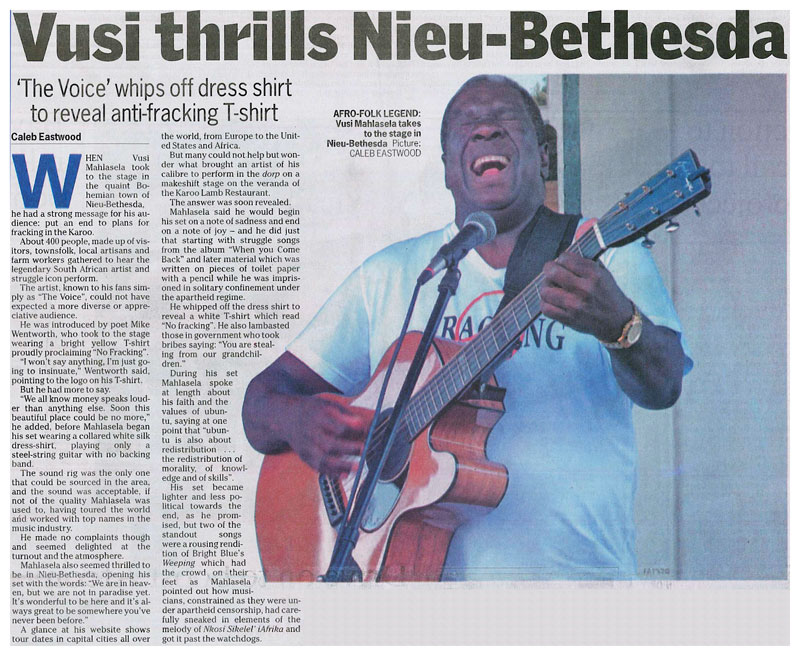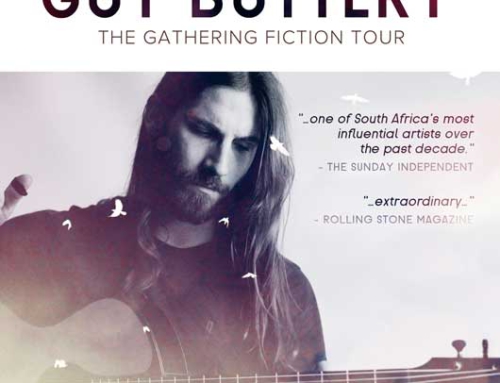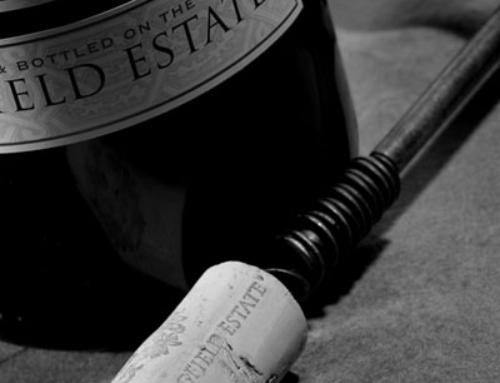The ‘Voice’ whips off dress shirt to reveal anti-fracking T-shirt
WHEN Vusi Mahlasela took to the stage in the quaint Bohernian town of Nieu-Bethesda, he had a strong message for his audience: put an end to plans for fracking in the Karoo. About 400 people, made up of visitors, townsfolk, local artisans and farm workers gathered to hear the legendary South Alrican artist and struggle icon perform. The artist, known to his fans simply as “The Voice”, could not have expected a more diverse or appreciative audience.
He was introduced by poet Mike Wentworth, who took to the stage wearing a bright yellow T-shirt proudly proclaiming “No Fracking”.
“I won’t say anything, I’m Just going to insinuate'” Wentworth said, pointing to the logo on his T-shirt. But he had more to say. “We all know money speaks louder than anything else. Soon this beautiful place could be no more,” he added, before Mahlasela began his set wearing a collared white silk dress-shirt, playing only a steel-string guitar with no backing band.
The sound rig was the only one that could be sourced in the area, and the sound was acceptable, if not of the quality Mahlasela was used to, having toured the world and worked with top names in the music industry. He made no complaints though and seemed delighted at the turnout and the atmosphere. Mahlasela also seemed thrilled to be in Nieu-Bethesda, opening his set with the words: “We are in heaven, but we are not in paradise yet. It’s wonderful to be here and it’s always great to be somewhere you’ve never been before.” A glance at his website shows tour dates in capital cities all over the world, from Europe to the United States and Africa. But many could not-help but wonder what brought an artist of his calibre to perform in the dorp on a makeshift stage on the veranda of the Karoo Lamb Restaurant. The answer was soon revealed. Mahlasela said he wouid begin his set on a note of sadness and end on a note of joy – and he did just that starting with struggle songs from the album “When you Come Back” and later material which was written on pieces of toilet paper with a pencil while he was imprisoned in solitary confinement under the apartheid regime.
He whipped off the dress shirt to reveal a white T-shirt which read “No fracking“. He also lambasted those in government who took bribes saying: “You are stealing from our grandchildren.” During his set Mahlasela spoke at length about his faith and the values of ubuntu, saying at one point that “ubuntu is also about redistribution … the redistribution of morality, of knowledge and of skills”. His set became lighter and less poIitical towards the end, as he promised, but two of the standout songs were a rousing rendition of Bright Blue’s Weeping which had the crowd on their feet as Mahlasela pointed out how musicians, constrained as they were under apartheid censorship, had carefully sneaked in elements of the melody of Nkosi Sikelel’ iAfrika and got It past the watchdogs.
AFRO-FOLK LEGEND:

Words and Picture: CALEB EASTWOOD



